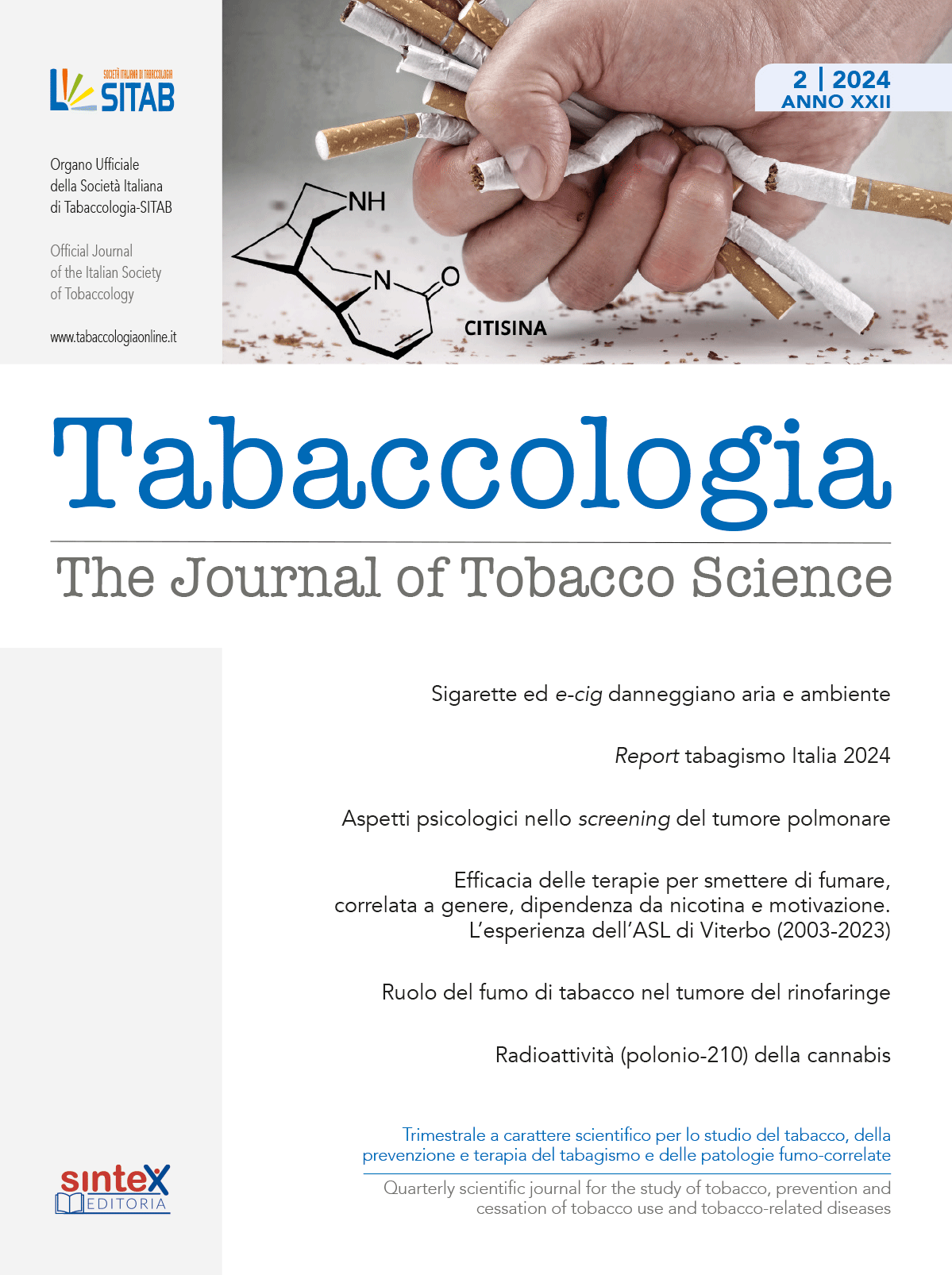|
Rassegna Stampa Scientifica Febbraio 2024
|
After an average follow-up of 13 years and five months, the risk of lung cancer among quitters fell 42%, with smaller falls of 27%, 20% and 14% recorded for liver, colorectal and stomach cancers respectively, compared with those who continued smoking. Details were published in Jama Network Open [Note: See below]... According to the study, smokers who quit before the age of 50 had their risk of lung cancer fall 57% over the follow-up period compared with those who continued to puff. Those who quit at 50 or older experienced a 40% reduction in lung cancer risk over that time." [Ian Sample. Quitting smoking reduces cancer risk at any age, says study, The Guardian]
“A top Biden administration health official is urging allies outside the government to lobby the White House to ban menthol cigarettes nationwide, fearing that President Joe Biden may abandon the proposal to avoid backlash from Black voters. Robert Califf, the commissioner of the Food and Drug Administration, has privately asked friends and public health experts to press their White House contacts over the status of the long delayed policy… He has voiced concerns that White House support for the ban is waning amid warnings that outlawing a product popular with Black smokers could dent enthusiasm for Biden’s reelection in the minority communities that are core to the president’s base. Califf’s behind-the-scenes encouragement… illustrates the extraordinary lengths that the FDA chief has gone in pursuit of a landmark tobacco policy he considers a top agency priority.” [Adam Cancryn, David Lim. A top official fears Biden might let politics interfere with public health, Politico]
“[Senate Majority Leader Chuck Schumer (D-NY) has] called on the Federal Trade Commission to investigate [nicotine pouch Zyn's] marketing, and for the Food and Drug Administration to look into ZYN’s health effects. He described the product as a “pouch packed with problems.” “I am delivering a warning to parents because these pouches seem to lock their sights on young kids, teenagers and even lower—and then use the social media to hook ’em"... Instead of encouraging people to quit tobacco products, critics worry that ZYN is a gateway to harmful cigarettes and vapes. A 2023 study found that 1.5 percent of middle high school students had used nicotine pouches in the past 30 days...
“As for the “ZYNsurrection,” anti-tobacco leader Sen. Richard Blumenthal (D-CT) told The Daily Beast he just doesn’t get it. “I’m not sure of the motivation,” Blumenthal said. “I sued the big tobacco companies. I’ve had to take action against vaping. Nicotine is a really powerfully addictive drug, and once kids are addicted, the door is open to other even more harmful products.” [Riley Rogerson. ‘Come and Take It’: Congress’ War Over ZYN Nicotine Pouches, Daily Beast]
Ten million fewer cigarettes will be smoked each day by 2040 under the government’s new generational smoking ban, new analysis shows. Historic legislation will be put before MPs this week, making it illegal to ever sell tobacco to those born after January 1, 2009, who are presently aged 15 and under. The ban will mean that by 2040, nobody under the age of 31 will have ever been able to smoke legally in the UK. Modelling by Cancer Research UK has examined the impact of banning this generation of young adults from ever taking up smoking.” [Eleanor Hayward. Smoking ban: 10 million fewer cigarettes will be smoked each day by 2040, The Times]
"Of course, the [UK] legislation could go further – reducing affordability is another form of regulation that we have seen work with other harmful products… However, what is important is that we recognise the opportunity the legislation proposal is giving us: a unique chance to change the nation’s health by preventing thousands of deaths and cases of disease. But over the coming weeks and months, there will be significant pressure from the tobacco industry on MPs to vote against the legislation. After all, their business relies on encouraging children to buy an addictive product so that they continue to make a profit… [thus] we must keep the facts at the forefront of the conversation so that when MPs are called to vote, they can do so with all the information to hand and make a balanced decision on behalf of their constituents." [Greg Fell. Big Tobacco will try its hardest to prevent the ban on disposable vapes and the reduction of the legal smoking age, New Statesman; See below: New tobacco and vaping legislation will go a long way to protect children’s health, BMJ; See also: How bad is vaping for your health? We’re finally getting answers, New Scientist]
"In this population-based cohort study of more than 2 million participants, the cancer risk showed a slightly higher value for 10 years after quitting compared with continued smoking, and then gradually decreased, reaching 50% of the risk associated with continued smoking after 15 years or more. Lung cancer risk decreased 3 years earlier than that of other cancer types, with a larger relative reduction. Meaning These findings suggest that sustained smoking cessation is associated with reduced risk of cancer, especially lung cancer, after 10 years since quitting smoking."
Cancer Risk Following Smoking Cessation in Korea
JAMA Netw Open. 2024;7(2):e2354958.
February 6, 2024
Eunjung Park, Hee-Yeon Kang, Min Kyung Lim, Byungmi Kim, Jin-Kyoung Oh
https://jamanetwork.com/journals/jamanetworkopen/fullarticle/2814567
Note: Open Access.
Related Coverage:
Ian Sample. Quitting smoking reduces cancer risk at any age, says study
“Tobacco companies created separate divisions to develop and roll out these products, and the majority developed medical research programmes to steer these [pharmaceutical-like] products through regulatory agencies, seeking certification as reduced-harm or pharmaceutical products. These products were regarded as key to the survival of the tobacco industry in an unfriendly political and social climate. Conclusions: Pharmaceuticalisation was pursued to perpetuate the profitability of tobacco and nicotine for tobacco companies, not as a sincere search to mitigate the harms of smoking in society.”
Pharmaceuticalisation as the tobacco industry's endgame
BMJ Glob Health. 2024 Feb 5;9(2):e013866.
Yogi Hale Hendlin, Elieen Le Han, Pamela M Ling
https://gh.bmj.com/content/9/2/e013866.long
https://gh.bmj.com/content/bmjgh/9/2/e013866.full.pdf
Note: Open Access.
"Ultimately, informed public health policies and regulations should be grounded in evidence-based research, striking a delicate balance between supporting adult smokers in reducing harm and protecting non-smokers and youth from potential risks... In conclusion, the safety of e-cigarettes is a complex and multifaceted issue that requires ongoing investigation and careful consideration of various factors. By addressing the limitations identified and continuing to conduct rigorous research, we can advance our understanding of e-cigarettes' safety profile and make more informed decisions to protect public health."
Comparative systematic review on the safety of e-cigarettes and conventional cigarettes
Food and Chemical Toxicology
Volume 185, March 2024, 114507
Available online 6 February 2024, Version of Record 9 February 2024.
Josef Yayan, Karl-Josef Franke Christian Biancosino, Kurt Rasche
https://www.sciencedirect.com/science/article/pii/S0278691524000735
Note: Open Access.
Related coverage:
How dangerous IS vaping compared with smoking? New review analyzes the dangers of both.... and finds former is linked to EIGHT lung diseases
“The UK government recently announced proposed legislation intended to prevent millions of children ever starting to smoke, while applying new restrictions on the availability and appeal of vapes to limit their use by young people and people who do not smoke… These measures are not intended to be a “silver bullet” that eliminates tobacco use altogether or entirely stops young people from vaping, but they will make UK tobacco control much stronger. There are obstacles to overcome before legislation can be passed and implemented. The biggest of these is attempts from tobacco industry lobbyists to stop, delay, and dilute legislation… The proposed legislation is ambitious and the most important in a generation for UK tobacco control. If successful, it will go a very long way to improving the health of our children for decades to come.”
Opinion
New tobacco and vaping legislation will go a long way to protect children’s health
BMJ 2024;384:q381 (Published 14 February 2024)
Sanjay Agrawal
https://www.bmj.com/content/384/bmj.q381
https://www.bmj.com/content/bmj/384/bmj.q381.full.pdf
Note: Open Access.
“Stricter regulations, including enforcing sales restrictions, and appropriate health-promoting campaigns are needed to prevent vaping by young people, but these measures must be balanced with the health needs of older adults who smoke and require support to quit. There is understandable scepticism about the motives of the tobacco industry in selling smoke-free products while continuing to expand tobacco markets in low-income and middle-income countries. To remain profitable, the tobacco industry will eventually need to migrate its global business to less harmful alternatives since cigarettes will no longer monopolise the delivery of nicotine.”
Harnessing tobacco harm reduction
The Lancet
COMMENT| VOLUME 403, ISSUE 10426, P512-514, FEBRUARY 10, 2024
Published: February 01, 2024
Robert Beaglehole, Ruth Bonita
https://www.thelancet.com/journals/lancet/article/PIIS0140-6736(24)00140-5/fulltext





















